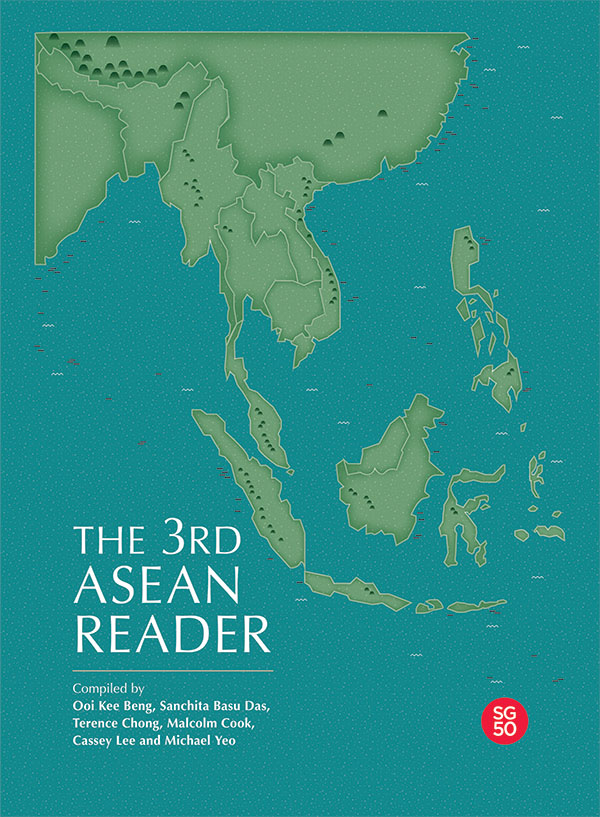Book contents
- Frontmatter
- Contents
- Preface
- Forewords to the First and Second ASEAN Reader: ASEAN: Conception and Evolution
- Forewords to the First and Second ASEAN Reader: ASEAN: The Way Ahead
- Forewords to the First and Second ASEAN Reader: New Challenges for ASEAN
- SECTION I ASEAN: THE LONG VIEW
- SECTION II COUNTRY ANALYSES
- SECTION III COMPARATIVE ANALYSES OF THE REGION
- Southeast Asian Societies
- The Southeast Asian Economy
- Southeast Asian Politics
- SECTION IV INTERNATIONAL DEVELOPMENTS
- SECTION V INSTITUTIONS OF ASEAN
- SECTION VI ASSESSING ASEAN'S INTERNAL POLICIES
- ASEAN Political Security Community
- ASEAN Economic Community
- ASEAN Socio-Cultural Community
- SECTION VII ASSESSING ASEAN'S EXTERNAL INITIATIVES
- ASEAN Processes
- ASEAN's Major Power Relations
- 71 ASEAN's Adventures
- 72 Developing an Enduring Strategy for ASEAN
- 73 Non-Traditional Security in China-ASEAN Cooperation: The Institutionalization of Regional Security Cooperation and the Evolution of East Asian Regionalism
- 74 China-ASEAN FTA Changes ASEAN's Perspective on China
- 75 Japan's Trade Policy with Asia
- 76 Managing Integration in East Asia: Behind Border Issues in Japan-ASEAN Trade Agreements
- 77 Fortifying the Japan-ASEAN Strategic Partnership: Abe's Quest for Viable Hedging Policies
- 78 Prospects for Korean-Southeast Asian Relations
- 79 China's Two Silk Roads: Implications for Southeast Asia
- SECTION VIII SOUTHEAST ASIA: PERIPHERAL NO MORE
- Bibliography
- The Contributors
- The Compilers
73 - Non-Traditional Security in China-ASEAN Cooperation: The Institutionalization of Regional Security Cooperation and the Evolution of East Asian Regionalism
from ASEAN's Major Power Relations
Published online by Cambridge University Press: 22 June 2017
- Frontmatter
- Contents
- Preface
- Forewords to the First and Second ASEAN Reader: ASEAN: Conception and Evolution
- Forewords to the First and Second ASEAN Reader: ASEAN: The Way Ahead
- Forewords to the First and Second ASEAN Reader: New Challenges for ASEAN
- SECTION I ASEAN: THE LONG VIEW
- SECTION II COUNTRY ANALYSES
- SECTION III COMPARATIVE ANALYSES OF THE REGION
- Southeast Asian Societies
- The Southeast Asian Economy
- Southeast Asian Politics
- SECTION IV INTERNATIONAL DEVELOPMENTS
- SECTION V INSTITUTIONS OF ASEAN
- SECTION VI ASSESSING ASEAN'S INTERNAL POLICIES
- ASEAN Political Security Community
- ASEAN Economic Community
- ASEAN Socio-Cultural Community
- SECTION VII ASSESSING ASEAN'S EXTERNAL INITIATIVES
- ASEAN Processes
- ASEAN's Major Power Relations
- 71 ASEAN's Adventures
- 72 Developing an Enduring Strategy for ASEAN
- 73 Non-Traditional Security in China-ASEAN Cooperation: The Institutionalization of Regional Security Cooperation and the Evolution of East Asian Regionalism
- 74 China-ASEAN FTA Changes ASEAN's Perspective on China
- 75 Japan's Trade Policy with Asia
- 76 Managing Integration in East Asia: Behind Border Issues in Japan-ASEAN Trade Agreements
- 77 Fortifying the Japan-ASEAN Strategic Partnership: Abe's Quest for Viable Hedging Policies
- 78 Prospects for Korean-Southeast Asian Relations
- 79 China's Two Silk Roads: Implications for Southeast Asia
- SECTION VIII SOUTHEAST ASIA: PERIPHERAL NO MORE
- Bibliography
- The Contributors
- The Compilers
Summary
INTRODUCTION
Security cooperation between China and the Association of Southeast Asian Nations (ASEAN) has not attracted much sustained attention, perhaps because it is not the kind of multilateral security cooperation one sees in NATO, the EU, or the Organization for Security Cooperation in Europe (OSCE). The Western model features treaty-based institutions, formal voting procedures, and binding rights, rules, and obligations for members. China-ASEAN security cooperation lacks these formal institutional traits; it has developed in the area of non-military threats to security. Accordingly, Western security analysts tend to view China-ASEAN non-traditional security (NTS) cooperation as being weak, ineffective, and lacking in strategic importance. The situation is further clouded by the fact that ASEAN is involved in schemes of NTS cooperation with countries other than China (e.g., Japan), and that the U.S. maintains strategic dominance through its military alliances and bases in East Asia.
Nevertheless, Western analysts have the necessary analytical tools to appreciate how China-ASEAN NTS cooperation has become an institutionalized process that affects both the strategic and political future of East Asia. The China-ASEAN “strategic partnership” is managed in an annual cycle of summits and high-level meetings that guides not only NTS cooperation but also the China-ASEAN Free Trade Area (ACFTA). This meeting-driven process constituting China-ASEAN economic and security cooperation has advanced concrete security cooperation schemes far more than either the Asia-Pacific Economic Cooperation (APEC) or ASEAN plus Three processes. Several key observations about the significance of this can be made. The formation of a China-ASEAN security regime internalizes the bilateral asymmetry in power, allowing China to address ASEAN's security and collective action problems as a leader. China-ASEAN NTS cooperation also facilitates military-to-military cooperation; it expands the offshore role of China's army and navy.
WHY IS NON-TRADITIONAL SECURITY IMPORTANT?
“Non-traditional security” is the term that China and ASEAN use for their cooperation in meeting non-military threats. Areas of cooperation include piracy, smuggling, human trafficking, drug trade, transnational criminal organizations, illegal immigration, cyber-piracy and cyber attacks, terrorism, subversion, and ethnic/religious movements. In addition, there are natural threats such as epidemics, typhoons, earthquakes, and tsunamis that require cooperation in disaster and post-disaster relief, disease control, and food security.
- Type
- Chapter
- Information
- The 3rd ASEAN Reader , pp. 378 - 383Publisher: ISEAS–Yusof Ishak InstitutePrint publication year: 2015

